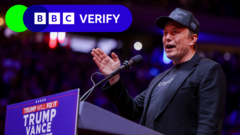Event JSON
{
"id": "caeed761e31c60468d7f265141377a036a9afb05284dd2120ef3b21a9f1bcf6d",
"pubkey": "0ed2d235d91c1775ed69ce216c4a720f9eb72e8dde40daf137f57f01a436c2fd",
"created_at": 1731532226,
"kind": 1,
"tags": [
[
"r",
"https://www.bbc.com/news/articles/cdj38mekdkgo"
],
[
"subject",
"Will Elon Musk be able to cut $2 trillion from US government spending?"
],
[
"published_at",
"1731525638"
],
[
"image",
"https://ichef.bbci.co.uk/ace/standard/240/cpsprodpb/e440/live/318b3a20-a1e7-11ef-8ab9-9192db313061.png"
],
[
"p",
"0ed2d235d91c1775ed69ce216c4a720f9eb72e8dde40daf137f57f01a436c2fd",
"wss://articles.layer3.news"
],
[
"imeta",
"url https://ichef.bbci.co.uk/ace/standard/240/cpsprodpb/e440/live/318b3a20-a1e7-11ef-8ab9-9192db313061.png"
],
[
"t",
"mainstream:perspective"
],
[
"summary",
"Musk's proposal to cut $2 trillion from US government spending by eradicating 'waste' has been met with skepticism by many experts. The US federal government spent $6.75 trillion in the most recent fiscal year, with around $880bn going towards interest payments on the national debt and $1.46 trillion on Social Security. Mandatory spending accounts for around 75% of total federal government spending, making it difficult to cut. Discretionary spending, which is easier to cut, accounts for around 25% of total spending. Musk's plan would require significant cuts to discretionary spending, including defense, transportation, and education, which could have significant consequences."
]
],
"content": "nostr:nprofile1qyd8wumn8ghj7ctjw35kxmr9wvhxcctev4erxtnwv4mhxqpqpmfdydwersthtmtfecskcjnjp70twt5dmeqd4ufh74lsrfpkct7sjkdh4h\nhttps://ichef.bbci.co.uk/ace/standard/240/cpsprodpb/e440/live/318b3a20-a1e7-11ef-8ab9-9192db313061.png\nThe Tesla CEO claimed he could slash US spending by eradicating “waste”.\nhttps://www.bbc.com/news/articles/cdj38mekdkgo",
"sig": "d5890f981c46cd4579bc838370f1d1734c42756fd87937065ee951686bb98ddcd1e28bd0d1666c4783e2a4ee39f065000fc939f70ce0666438d8f697c713985d"
}


